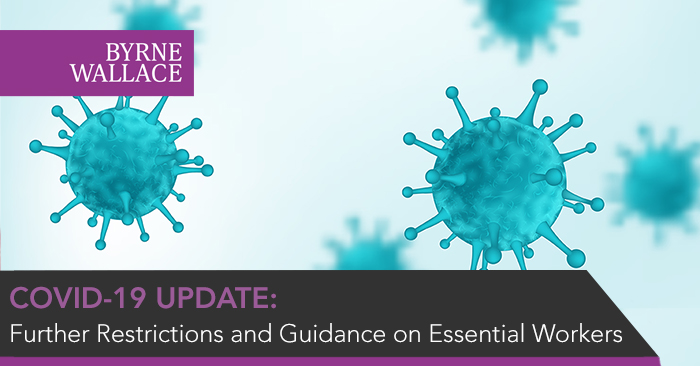COVID-19: Government announces further restrictions and issues guidance on essential workers (27 March 2020)
Monday, 30 March 2020
As the Covid-19 health emergency continues to escalate significant new restrictions on work and travel were announced by the Irish Government on the evening of Friday, 27 March 2020.
These restrictions prohibit travel outside of the home save in very limited circumstances. Some of the circumstances in which travel is permitted are to travel to and from work, or for the purposes of work, only where the work is an essential health, social care or other essential service and cannot be done from home.
The government separately released guidance on what constitutes essential workers, this guidance will be updated and the Government has recognised that gaps or issues may arise. The guidance is available at on the Department of the Taoiseach's website - see link here
If an employee carries out an activity that is necessary for the continued provision of an essential service by another organisation or is part of an essential supply chain, the employee should continue to carry out that activity. To the maximum extent possible that activity should be done remotely.
Examples of essential services whose workers are allowed to continue to work include:-
- Essential retail outlets (which would include retail and wholesale sale of food, beverages and newspapers, pharmacies and chemists and fuel stations).
- Certain types of manufacturing such as the manufacture of pharmaceutical products and pharmaceutical preparations and the manufacture of products necessary for the supply chain of essential services, electronic and optical products including semi-conductors, electrical equipment and medical devices.
- The supply, repair and installation of machinery and equipment, and industrial machinery and equipment for essential services is also permitted.
- Construction on essential health and related projects relevant to the Covid-19 crisis and supplies necessary for such products, repair/construction of critical road and utility infrastructure and delivery of certain emergency services to businesses and homes.
- Banking and financial services (including banks, credit unions and post offices) and accountancy, legal and insurance services necessary to support essential services and vulnerable people.
If an organisation is providing an essential service, those employees (including sub-contractors) who are essential to the provision of that service should be notified, that may be all employees in the organisation. Employees should carry a work identification or a letter from their employer indicating that they are an essential employee when travelling to or from work and should also carry at least one other form of identification.
Organisations who are engaged in an essential service should have readily available back up documentation to demonstrate the basis on which they are considered to be providing an essential service and why any work cannot be undertaken by employees at home.
Such organisations should also have business continuity and resilience plans in place. This should take account of the possibility that key workers or key facilities may be impacted by COVID-19.
For further information, please contact any member of our COVID-19 Advisory Group, or your usual Byrne Wallace Shields LLP contact.
Please note that the content of this summary does not amount to professional advice. Legal and tax advice should be sought in respect of specific queries. The COVID-19 situation is evolving rapidly and this update is provided on the basis of information available as at 30 March 2020.

